Prioritizing women’s health in performance is crucial to athletic success, injury prevention, and long-term wellbeing, yet it remains significantly understudied and often overlooked.
Our recent roundtable, moderated by Andrew Trimble, brought together leading experts to address gaps in research, nutrition, training, and support for female athletes:
- Anna Hopkin, Olympic Gold Medalist, British Swimming Team
- Darren Crocker, AFLW Senior Coach, North Melbourne Football Club
- Cory Price, Director of Medical & Performance, Orlando Pride
- Dr. Tenley Murphy, Assistant Athletic Director, Sports Medicine, Clemson

Below are the key insights from this important conversation.
The Foundation for Change
“Build a system that will fit your athlete, not fit your athlete into a system.” This powerful quote from Cory Price captures the essence of the conversation on women’s health in performance. Despite advances in sports science, female athletes remain underserved in research and training protocols. Price emphasized that most of the data is based on males, and meaningful change can only begin when we advocate for more research and funding in women’s sports.
Female Physiology and Development: One Size Doesn’t Fit All
Female athletes face distinctive physiological challenges that require individualized approaches. One of the most significant gaps in women’s sports science is menstrual cycle research. Price highlighted how periodization strategies often fail to consider individual needs, leaving female athletes without tailored support.
These challenges become particularly evident during puberty. Anna Hopkin observed that while boys often see performance gains during this time, girls experience body changes that may initially hinder their athletic development. This transition can significantly impact self-esteem and performance.
“You need a support system in place for the things you don’t always think about – like the emotional side of sports,” Hopkin emphasized. “Building strong relationships while you’re competing ensures you have people to lean on, both during and after your athletic career.”
Early Intervention is Key
Nutrition plays a crucial role in performance and recovery, yet many female athletes struggle with proper fueling. Dr. Murphy advocated for early intervention, recommending nutrition education and foundational movement training for young female athletes.
“We are putting so much emphasis on gains, we are not talking to our younger athletes about how to care for their bodies,” Dr. Murphy explained.
The consequences can be serious. Darren Crocker shared alarming data revealing that 6 out of 30 of his tested athletes showed signs of Relative Energy Deficiency in Sport (RED-S) – meaning they weren’t consuming enough nutrients to meet their energy demands. This not only affects performance but also increases injury risk and can lead to long-term health issues. These findings emphasize Dr. Murphy’s point about the critical importance of early education – without proper nutritional knowledge from the beginning, young athletes may develop patterns that compromise their health and performance throughout their careers.
Creating a Safe and Supportive Environment
A recurring theme throughout the discussion was the importance of environment. Crocker emphasized that both physical and psychological safety are necessary for peak performance: “I’ve never really seen an unhappy athlete perform at their very best. They need to feel both physically and psychologically safe.”
Hopkin noted that female athletes are often hesitant to have certain conversations due to potential repercussions, reinforcing the need for safe spaces where open dialogue is encouraged.
Beyond Competition: Pregnancy and Career Transitions
Female athletes face additional challenges beyond competition, such as pregnancy and post-career transitions. Price stressed the need for proactive support in these areas to ensure female athletes don’t feel isolated or underprepared when they step away from sport. His advocacy for providing resources for a “soft landing” highlights the broader responsibility of sports organizations to care for their athletes beyond their playing years.
From Conversation to Action
Research and funding remain the biggest barriers to progress. One of the most powerful catalysts for change is the shift towards prioritizing women’s data. As this roundtable highlighted, the current lack of female-specific research has led to training and nutrition protocols that are based predominantly on male data. To make real progress, we need to ensure that female athletes’ unique needs are addressed with tailored support.
True progress in women’s health and performance starts with listening, learning, and taking action. By advocating for more research, improving education, and creating supportive environments, we can ensure that female athletes receive the attention and resources they deserve.
This panel was brought to you by Teamworks Performance, and the best news is, this is only the beginning…stay tuned for our next women’s health roundtable in the series.
Have thoughts on what we should cover next? Email us at performance@teamworks.com.
